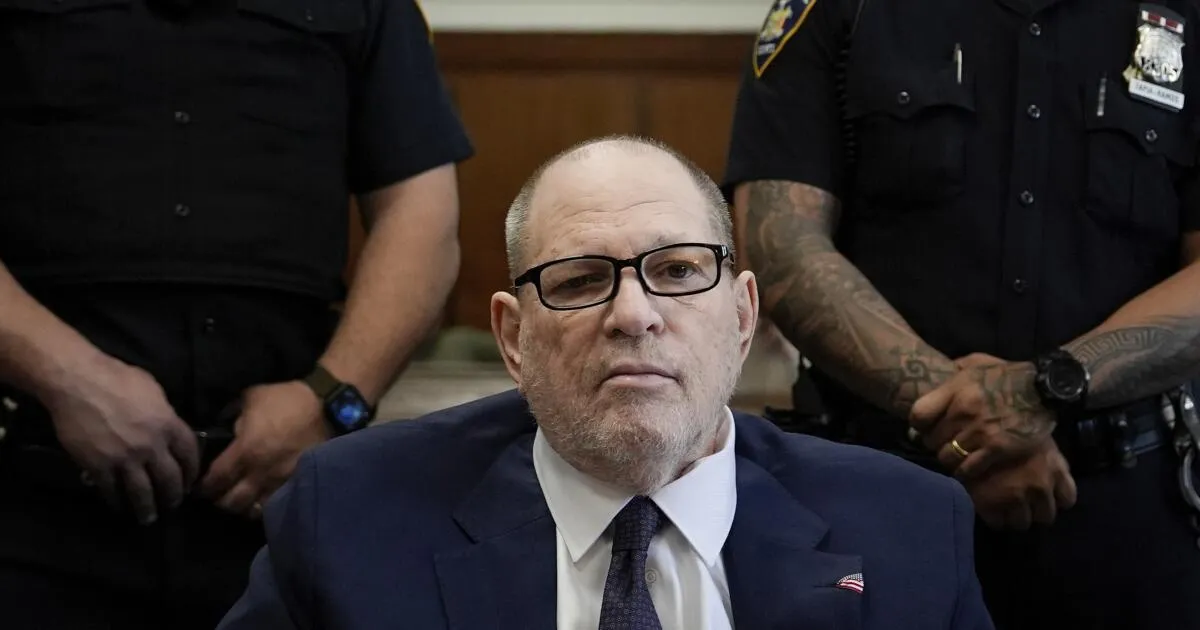
Harvey Weinstein, the disgraced Hollywood executive whose alleged history of sexual assault ignited the MeToo movement, has been found guilty of one count of sexual assault from 2006 while being acquitted on another charge from the same year. This decision came from a majority-female jury after a week of deliberations in a high-profile retrial in New York. Weinstein was previously convicted in February 2020 of rape and a felony sex crime associated with allegations made by accusers Jessica Mann and Mimi Haley. He was sentenced to 23 years in prison after that conviction, though a New York appeals court overturned his rape conviction in April 2024.
On Wednesday, the jury convicted Weinstein of forcing oral sex on Haley while acquitting him of similar charges related to former model Kaja Sokola. The jury remained deadlocked on a third charge concerning the rape of Mann in 2013, according to reports from the Associated Press. This split verdict underscores the complexities of the case and the ongoing impact of Weinstein's actions within the entertainment industry.
In the closing arguments presented on June 4, Weinstein’s defense attorney, Arthur L. Aidala, attempted to downplay the accusations, referring to the alleged assaults as part of a "courting game" and "transactional" exchanges. Aidala argued that prosecutors were "trying to police the bedroom" and labeled Weinstein the "poster boy, the original sinner" for the MeToo movement. Conversely, prosecutor Nicole Blumberg firmly countered these claims, emphasizing that the incidents were not games, but rather serious crimes of rape.
Following the verdict, Haley's attorney, Gloria Allred, expressed her pride in representing a "very courageous" client and referred to Haley as a "shero" of the MeToo movement. Haley herself thanked the jury for recognizing the truth behind the defense's arguments, stating the verdict provides hope for others affected by sexual violence, emphasizing that the notion of the "perfect victim" is fading.
The retrial, which began on April 23, featured emotional testimonies from multiple accusers, including Haley and former aspiring actress Mann. Judge Curtis Farber oversaw the proceedings, during which Weinstein faced allegations that led to his previous convictions along with new charges from Sokola, who claimed he forced oral sex on her in 2006 when she was just 19 years old. Throughout the trial, Weinstein maintained his innocence, asserting that any interactions were consensual.
During her testimony, Haley recounted meeting Weinstein at the Cannes Film Festival before the alleged assault, highlighting her desire to advance her career rather than seeking a romantic encounter. Sokola, who testified for the first time in this retrial, described how Weinstein's unwanted advances began when she was a teenager, ultimately leading to her allegation of sexual assault in a Manhattan hotel.
Mann also returned to the stand, recalling her complicated relationship with Weinstein, including an alleged rape in a New York hotel room in 2013. Her testimony revealed the coercion she felt during the incident, which she described as leaving her feeling "defiled." Mann spoke of her attempts to maintain professional relations with Weinstein post-assault, which illustrates the complex dynamics victims often navigate in the wake of such traumatic experiences.
The trial was marked by tensions as Weinstein's defense team challenged the credibility of the accusers, questioning their motivations and the nature of their relationships with Weinstein. The defense argued that the women continued to engage with Weinstein after the alleged assaults, suggesting ulterior motives for their testimonies. However, accusers like Haley passionately defended their experiences, emphasizing the impact of their encounters with Weinstein.
As the trial progressed, the courtroom witnessed emotional exchanges and dramatic moments, including Mann’s pointed gestures toward Weinstein, prompting requests for mistrial from his defense team. These interactions highlighted the intense emotional weight of the proceedings for the victims.
Despite the retrial's outcome, Weinstein’s legal battles are far from over. He has faced multiple charges across different jurisdictions, including a separate conviction in Los Angeles for rape in December 2022. Weinstein's legal team has indicated plans to appeal these convictions, prolonging the saga of one of Hollywood's most infamous figures.
As the MeToo movement continues to reshape conversations around sexual violence and workplace harassment, the Weinstein case remains pivotal in highlighting the importance of holding powerful individuals accountable for their actions. The verdicts from this retrial reflect a growing recognition of the complexities surrounding sexual assault and the courage of those who come forward to seek justice.